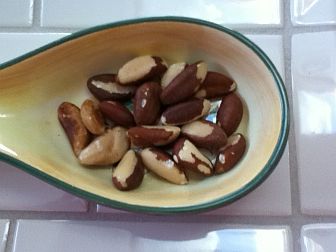Selenium Functions and Sources

Selenium Functions and Sources
Selenium is a mineral that helps your well-being, so if you don't get enough from your diet, your won't feel your best. Here is a quick summary of the role selenium plays in your good health.
| What it does | Part of antioxidant activity; Involved in activation of thyroid hormone |
| Daily needs | [Infants: 15-20 µg] [Children: 20-55 µg] [Men: 55 µg] [Women: 55 µg] [Pregnant: 60 µg] [Lactating: 70µg]] |
| Not enough | Severe deficiency can lead to heart disease |
| Too Much | Skin abnormalities including rash; hair loss; irritability; bad breath |
| Foods | Organ meats, seafood, meat, grains, Brazil nuts, vegetables and fruits |
*The lower value is for infants up to 6 mos., higher value is for infants up to a year old.
† The first value is for children 1-3 with the amount increasing until age 18.
You only need a bit
Note that the adequate daily intake of selenium is given in micrograms (µg). A microgram is .0001 milligrams (mg), so it is a very small amount. Only a trace of this mineral is needed, but it is nevertheless very necessary to your good health.
Protects you from the bad guys
Selenium functions in your body as an antioxidant mineral that helps limit the damaging effects of free radicals, by helping to block the formation of these unstable and highly reactive molecules. In addition, selenium forms part of the enzyme that activates the thyroid hormone.
Interesting Fact about Selenium Functions and Sources: Selenium can replace sulfur in certain proteins if not enough sulfur is available.
Deficiency is uncommon
Most people get enough selenium, and when deficiency does occur, it is generally associated with digestive problems such as Crohn’s Disease or with poor or restrictive diets. Since selenium is found in the soil, the selenium content of fruits and vegetables will fluctuate, based on the amount of selenium in the soil.
Interesting Fact for Selenium Functions and Sources: Selenium and Vitamin E are often combined in supplements, because they work together to prevent the formation of those bad guys called "free radicals."
Too much can harm you
Too much selenium in your diet can be toxic. If you choose to take selenium supplements, be aware of the dose and consider carefully whether it is necessary, since most people in developed countries get more than the recommended daily amount of selenium in their diet. Selenium toxicity is unlikely to occur when the only source is food.
Disease prevention
Research has shown that there is a correlation between selenium deficiency and heart disease. On the other hand, there is no evidence that taking excessive amounts of selenium will help your heart. Instead, eating a diet that contains fresh, whole foods will provide the selenium your body needs to maintain good heart health.
There is also evidence that getting enough selenium in your diet may help prevent cancer. This is most likely due to its antioxidant effect. Selenium is also necessary for your immune system to function properly.
One more thing
Although scientists are not sure why, people who are low in selenium tend to suffer with a higher rate of depression. The theory is that selenium is involved with the production of serotonin, a chemical in the brain that affects mood. Just to be sure, eat a couple of Brazil nuts today. It might make your day brighter if your supply of selenium is assured!
Fun Fact about Selenium Functions and Sources: Brazil nuts are one of the richest sources of the mineral, selenium. Just one ounce of these nuts can supply as much as 700% of the daily requirement for selenium. Since they are also high in fat, you should eat them sparingly. Vegetarians can eat Brazil nuts as a non-meat source of this important antioxidant mineral.
Upper Level
The upper intake level for adults for selenium has been established at 400 µg per day.

